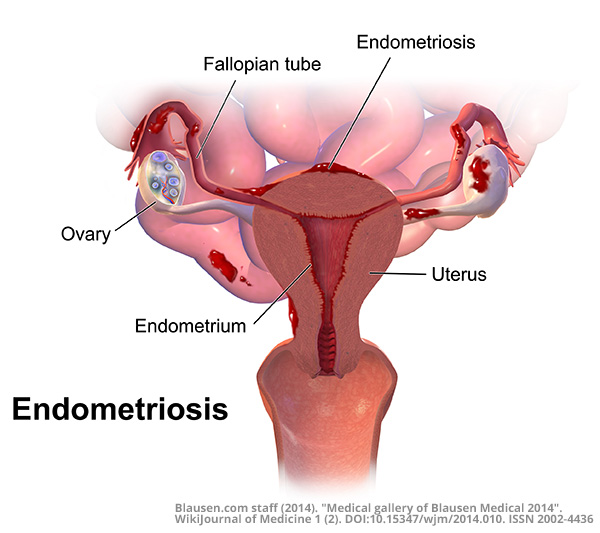What are the medical treatment options for endometriosis?
By Moona Arabkhazaeli, MD
Minimally Invasive Gynecologic Surgeon
Background: What is endometriosis?
Endometriosis is a disorder in which the tissue that lines the inside of the uterus - the endometrium - grows outside the uterus. Most commonly it is found on the ovaries, the fallopian tubes and the tissue lining your pelvis. Rarely it can be found in other areas, including the intestines, the bladder, and even the lungs or diaphragm. This endometrial tissue grows and bleeds with each menstrual cycle, resulting in production of substances that cause inflammation and pain, and eventually scar tissue.

 Who is a candidate for medical treatment options?
Who is a candidate for medical treatment options?
If you suffer from periods that are perceived as painful you may be a candidate for medical therapy. You don't have to have a "proven" diagnosis of endometriosis to undergo treatment.
How do I choose an option?
There are no data supporting one form of medical treatment over another, and it is not a "one size fits all" approach. Choice of treatment depends on symptom severity, preferences, medication side effects, contraceptive needs, costs, and availability. I encourage you to talk to your doctor about the pros and cons of all of the options. Some patients try medication as a first approach before considering surgery, but that is not mandatory. The indications and benefits of surgical treatment will be discussed in a future post.
Pain medications
Since endometriosis incites inflammation, nonsteroidal anti-inflammatory drugs (NSAIDs) are recommended. These can be helpful in some patients, but since endometriosis is a hormonally mediated disease, often hormonal treatment is indicated. These options are discussed below.
Hormonal Treatment Options
Combined hormonal (estrogen and progesterone) contraceptives (CHCs)
These come in the form of a pill, patch, or ring, and known as traditional "OCPs." They are usually the first line approach, as can be used long-term, are well-tolerated, are relatively inexpensive, and provide contraception and additional benefits including decreasing the risk of ovarian and endometrial cancers. They work to suppress endometriosis disease activity by suppressing ovarian function, which results in atrophy of endometrial tissue. They can be taken cyclically, where you still have a monthly period, or continuously, where you skip a period; both have equal safety. A dedicated blog post on CHCs will be posted in the future.
Progestins
Some suggest that progestin-only options are superior to CHCs, because they don't contain estrogen and endometriosis is an estrogen dependent disease, though this has not been proven. Progestins do have other advantages including anti-inflammatory properties, and a lack of the thromboembolic (aka blood clot) risk that estrogen carries. A disadvantage to progestins compared to CHCs is that while CHCs maintain a regular menses, continuous progestins can suppress periods completely (ie amenorrhea) or result in irregular bleeding. While this does not have negative long-term consequences (owing to its mechanism), it may be bothersome for some. Progestins take be taken in the form of a pill (norethindrone acetate or medroxyprogesterone acetate most commonly), an injection ("Depo provera," administered every 6 months), the etonorgestrel arm implant ("Nexplanon"), or the levonorgestrel intrauterine device (IUD).
Gonadotropin-releasing hormone (Gn-RH) agonists and antagonists
These drugs block the production of ovarian-stimulating hormones, lowering estrogen levels and preventing menstruation. This causes endometrial tissue to not be stimulated and ultimately atrophy. Because these drugs create an artificial menopause, one often experiences menopausal side effects such as hot flashes, sleep issues, and vaginal dryness. Some of the newer oral options mitigate this by including a low dose of estrogen and progestin within the medication.
Topics
Share this page:
About the Author
Moona Arabkhazaeli, MD
Minimally Invasive Gynecologic Surgeon
 Dr. Moona Arabkhazaeli brings specialized expertise in Minimally Invasive Gynecology Surgery to her role at Minnesota Women's Care. Her dedicated focus lies in areas such as abnormal uterine bleeding, endometriosis, pelvic pain, and fibroids. Dr. Arabkhazaeli's expertise extends to minimally invasive surgical techniques, which optimize patient outcomes by reducing complications and expediting recovery. With a patient-centered approach, she emphasizes compassionate and personalized care, aiming to empower women in their healthcare journey. Dr. Arabkhazaeli's dedication to innovation and her proficiency in minimally invasive techniques underscore her commitment to delivering optimal outcomes for her patients.
Dr. Moona Arabkhazaeli brings specialized expertise in Minimally Invasive Gynecology Surgery to her role at Minnesota Women's Care. Her dedicated focus lies in areas such as abnormal uterine bleeding, endometriosis, pelvic pain, and fibroids. Dr. Arabkhazaeli's expertise extends to minimally invasive surgical techniques, which optimize patient outcomes by reducing complications and expediting recovery. With a patient-centered approach, she emphasizes compassionate and personalized care, aiming to empower women in their healthcare journey. Dr. Arabkhazaeli's dedication to innovation and her proficiency in minimally invasive techniques underscore her commitment to delivering optimal outcomes for her patients.
If you or someone you know is experiencing symptoms of endometriosis, visit mnwcare.com or call 651-600-3035.
Appointments
